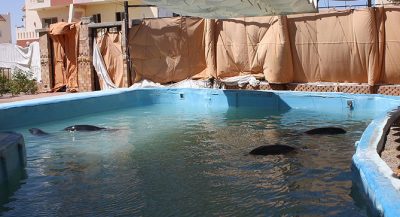 The demand for exotic animals in the Middle East – and particularly in the Gulf and Egypt- is putting animal’s lives at risk
The demand for exotic animals in the Middle East – and particularly in the Gulf and Egypt- is putting animal’s lives at risk
From pet cheetahs on the streets of Dubai to python and falcon egg smuggling, the Middle East clearly has a wildlife trafficking problem. Even more troubling is that the market for these exotic animals is so lucrative that smugglers are putting the animal’s life at serious risk just to make a quick buck. According to the Middle East branch of the International Fund for Animal Welfare, smugglers commonly sedate young animals and carry them on board planes in hand luggage. But many never survive the journey.
“Usually, the animals die, but because of the large profits, smugglers will take a chance in case one of them survives,” Dr Elsayyed Mohamed, programme manager at the International Fund for Animal Welfare (IFAW) told The National. The trade in rare animals and plants is regulated by the Convention on International Trade on Endangered Species of Wild Flora and Fauna but enforcing the international treaty is tricky especially as custom officials need to be trained on recognising species and the regulations pertaining to their protection.
UAE Attracting Wildlife Traffickers
IFAW also noted that the UAE, as trading centre in the region, tends to attract illegal trafficking of animals. Indeed, many of the stories we’ve covered here at Green Prophet on wildlife trafficking are located in the UAE where wildlife animal ‘pets’ for the stupidly rich is not unheard of. Back in May, an Emirati was arrested for trying to smuggle baby leopards, a monkey, a gibbon and a Malayan sun bear in two of his suitcases.
Cheetahs and lion cubs, baboons, rare ornamental birds, houbara bustards and falcons are the species most frequently smuggled into the UAE. As well as pets, some animals end up in private zoos whilst others are re-exported to make a profit.
Gorilla Smuggling To Middle East Putting Species At Risk?
The Guardian also recently reported that a surge in the poaching of baby gorillas from the Democratic Republic of Congo poses a fresh risk to the endangered species. Mountain gorillas are critically endangered with under 800 left in the world but as they can fetch up to $40,000, the smugglers are willing to take the risk.
Ian Redmond, chairman of the conservation group the Ape Alliance, told the Guardian that wealthy animal collectors in Middle East are the likely source of demand although there is little evidence to back this. Karl Ammann, who was interviewed by Green Prophet also claimed that dozens of gorillas and hundreds of chimpanzees have been taken from Cameroon via Nigeria to Egypt. Dr Mohamed of IFAW told the National, “We recommend more supervision and more inspectors to control this trade.”
:: The National and The Guardian
:: Image via _Wichid_/ Flickr.
For more on wildlife smuggling into the Middle East see:
Wild Animal ‘Pets’ Still Commonplace in the Gulf
Live Baby Leopard Found In Suitcase En Route To Dubai
Dubai Porsche Driver Walks Pet Cheetah On A Leash
Two Kuwaiti Men Get The Squeeze For UAE Python Smuggling Attempt



